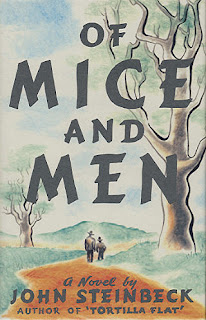Title: Billy Budd, Sailor
Author: Herman Melville
Copyright: Written after 1886 and before Melville’s death in 1891. It was later found, in manuscript form, and eventually published in 1924.
SPOILER ALERT: It is difficult to discuss the main themes without talking about the ending of the book. If you do not want to have the book spoiled for you, I would suggest reading the book before reading this blog.
Summary: The story takes place in the last years of the 18th century. It is about a young sailor named Billy Budd, who is around 18 years old. When the story begins, Billy is working on the merchant ship “Rights-of-Man”. The merchant ship is inspected by an officer on a British naval warship and Billy is impressed (involuntarily recruited) into working on that ship, the H.M.S. Bellipotent. Billy is the only one from his ship that is impressed. On the new ship, he quickly witnesses a flogging take place, as a punishment, and realizes how much trouble he can get in even with minor misconduct of any kind. But Billy eventually makes friends with just about everyone on board and is even evaluated for promotion by the officers not long after boarding the ship. The climax occurs when the Master-at-Arms (Claggart), possibly the only one on the ship that does not like Billy, falsely accuses Billy of being a mutineer. When the captain, who does not believe the Master-at-Arms, has him make the accusations to Billy’s face, Billy is unable to answer. He has a small stuttering problem and he is virtually speechless when he is either very afraid or very angry. After a long period of attempted refute, Billy let’s his fist do the talking for him. He punches the Master-at-Arms in the face. He falls to the ground and dies. The captain, who witnessed the whole thing, called a drumhead court martial to try Billy. Since they had no proof of mutiny (and none of them believed the charge anyway), the only charge was that he punched a superior officer that resulted in his death, which of course, was not Billy’s intentions. Of the three officers and the captain, all of them wanted to acquit Billy of the charge. But since the threat of mutiny was already a great fear, they chose to condemn him to death hoping it would deter any actual future mutineers. In the end, Billy was hung on the ship. There is very little dialogue in the book and most of the chapters fill the requirement of giving the back story. But it is a good book and it definitely gets you thinking. Here are a few of my observations.
Observation #1:
Law vs. Conscience
In the book, the court martial consisted of 5 individuals. Billy was the accused, Captain Vere was the witness and three high-ranking officers were the jury. Captain Vere and all of the officers liked Billy. They all disliked the Claggart. They knew that the accusations of mutiny were false. They knew Billy was an honest and hard worker and not one of them wanted to see him hang. In fact, the three officers were ready to deliver a unanimous acquittal until Captain Vere gave them a lecture on the rule of law. He told them to make the decision based on the law only. This is why they eventually condemned him, after a significant struggle, to hang. They couldn’t see a way around the law. Just as laws must be kept, the commandments must also be kept. “And I say unto you again that he cannot save them in their sins; for I cannot deny his word, and he hath said that no unclean thing can inherit the kingdom of heaven; therefore, how can ye be saved, except ye inherit the kingdom of heaven? Therefore, ye cannot be saved in your sins.” (Alma 11:37). According to the law (for they were at a time of war and operating under the Articles of War), Billy did commit a crime by striking a superior officer. This was irrefutable since it was done in the presence of Captain Vere. So the story of Billy Budd ends with his hanging, because the court could not see a way around the law.
Observation #2:
Law vs. Mercy
What they lacked was mercy, or a way to implement mercy. To them, they did not see any reconciliation between law and mercy, so they followed what they believed to be the law. Spiritually, however, there is room for both law and mercy. “Therefore, according to justice, the plan of redemption could not be brought about, only on conditions of repentance of men in this probationary state, yea, this preparatory state; for except it were for these conditions, mercy could not take effect except it should destroy the work of justice. Now the work of justice could not be destroyed; if so, God would cease to be God. And now, the plan of mercy could not be brought about except an atonement should be made; therefore God himself atoneth for the sins of the world, to bring about the plan of mercy, to appease the demands of justice, that God might be a perfect, just God, and a merciful God also. For behold, justice exerciseth all his demands, and also mercy claimeth all which is her own; and thus, none but the truly penitent are saved.” (Alma 42:13, 15, 24). Because of the law of God, not one of us is fit to return to the kingdom of God of our own accord. But Jesus Christ stepped forward and offered to pay the price of our sins, thus allowing justice and mercy to work together, allowing those who are willing to repent, the ability to be reconciled to God.
Observation #3:
Dying with a Clear or Guilty Conscience
Despite the tragic ending to Billy Budd, it was comforting knowing that he had peace in his death. It reminded me of the words the Prophet Joseph Smith spoke as he was leaving for Carthage; “I am going like a lamb to the slaughter; but I am calm as a summer’s morning; I have a conscience void of offense towards God, and towards all men”. His perspective was eternal. He knew that there were worse things that could happen than physical death. He was a righteous man and a diligent prophet and he knew he had lived his life in harmony with God. He had peace knowing he had passed this earthly test and would have eternal life. Billy Budd, although far from a prophet, was also a very good person. Despite the scene that got him in so much trouble, he didn’t really have a mean bone in his body. After it was over he felt very sorry and he was accepting of his death sentence. We can also compare and contrast two groups of people in the Book of Mormon. In chapter 28 of Alma, we are shown two different types of mourning that was taking place amongst the Nephites and the Lamanites after a series of great battles that resulted in thousands and thousands of deaths. “…yea many thousands are mourning for the loss of their kindred, because they have reason to fear, according to the promises of the Lord, that they are consigned to a state of endless wo. While many thousands of others truly mourn for the loss of their kindred, yet they rejoice and exult in the hope, and even know, according to the promises of the Lord, that they are raised to dwell at the right hand of God, in a state of never-ending happiness.” (Alma 28:11-12). Although most of us fear death to some degree, that fear can be swallowed up in Christ. If we are righteous, we have nothing to fear.










